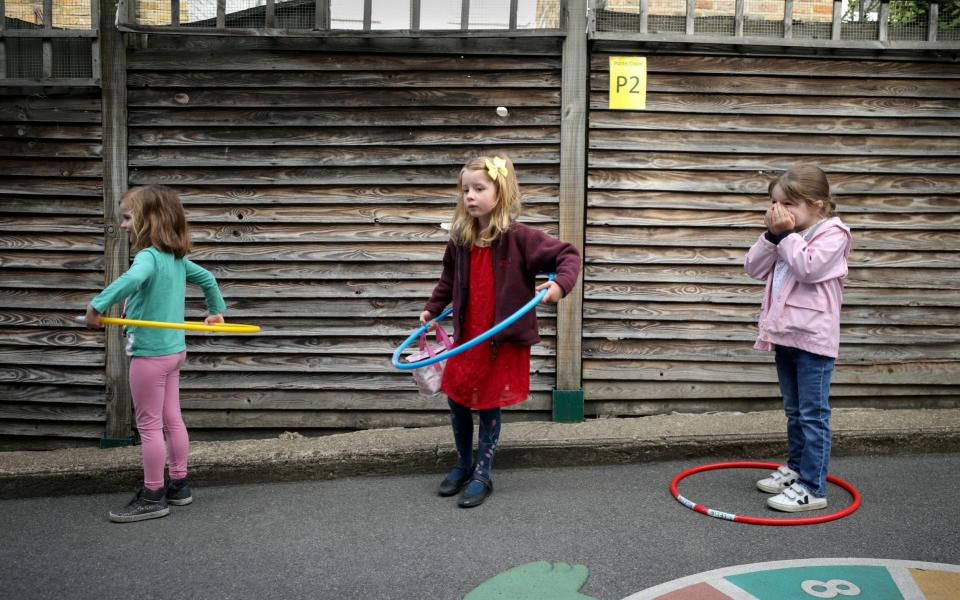Schools have become 'play-starved stress factories'. We need to let children play, especially now

Play is a fundamental part of how we explore the world, but between the fear associated with coronavirus and the stripping back of school curriculums, play is being lost at a time when children need it most.
Social isolation and toxic stress have caused "incalculable damage", according to Pasi Sahlberg and William Doyle, authors of Let the Children Play: For the Learning, Well-Being, and Life Success of Every Child (OUP, £18.99). Drawing on extensive medical and scientific evidence for the benefits of play, their book calls for a ‘play renaissance’ in schools and wider society.
So what is play? Sahlberg and Doyle define play as a joyful activity that is "intrinsically motivated, entails active engagement, and results in discovery".
"Play is the learning language of children - it’s absolutely critical for a child’s wellbeing, health and learning, in and out of school, well into adolescence and beyond," says US scholar Doyle.
Finnish educator Prof Sahlberg adds that "children are biologically engineered to play, have fun, move, run, tumble, take risks, hug, sing and dance, [both] in and out of school".
Playing is a positive and often therapeutic experience for children and parents but without it, hidden negative emotions and fears can cause long-term trauma.
"The pandemic makes it clear that we need entirely new ways of thinking about childhood education," states Doyle.
"In a world grappling with medical crises, climate change and socio-economic dislocations and upheavals, we need creative, inspired, independent and well-rounded young people. Play will help us get there."
In the book, the authors warn that schools are becoming "play-starved stress factories", but it’s not too late for change: "Play has the power to transform society and if we make it a top priority in post-pandemic schools, children will be happier, healthier and more engaged," says Doyle, who urges politicians and educational policy-makers to put play at the heart of education.
“Coronavirus is an opportunity to bring play-based outdoor learning to the fore because it’s easier to socially distance in the fresh air,” advises Dr Alun Morgan, lecturer in education at the University of Plymouth, who also wants to see a step-change.
"The world is dynamic and as primates, we learn through play. We’ve evolved a process of inquiry-based learning that builds in flexibility, resilience and ability to problem solve and innovate. We all need more play and without that space to experiment we risk losing adaptability."
As a result of school closures, the cancellation of many standardised tests has rendered exams "irrelevant", Sahlberg argues. "The virus may help move childhood education from a system based on punitive screening, tracking and exclusion based on standardised test data, towards a much better, truly high-performing system based on inclusion, equity, fair funding, and cherishing each child as equally deserving of love, support, well-being and play in school."
Rather than focusing on narrow academic measures of success, schools could take a more holistic approach, like that adopted by Finland’s world-renowned education system.
When Doyle moved from New York to Finland, he was impressed by the structure of the school day - 45-minute lessons were often followed by 15-minute unstructured play breaks. Yet when Sahlberg moved from Finland to the US, he was shocked by the contrast he encountered.
Jenny Malloch, a teacher with 30 years’ experience, admires Finland’s education model where children begin school at the age of seven. In her foundation classroom at St Leonard’s C of E Primary School in Exeter, she opts to have fewer tables, more carpet space for train tracks, marble runs or rolling on the floor plus plenty of space for cosy den-making or acting out stories with small world toys.
"Since lockdown, I feel there’s more pressure on us to make up for lost time and the learning experience has had to become less multi-sensory for hygiene reasons," explains Malloch. "Children can’t share sand or play dough, we’re not meant to be singing which is a staple for this age group and we’d prefer to have wooden toys and more natural materials but plastic toys are easier to wash."
Malloch continues to structure the school day to incorporate as much free play in the classroom and outdoor space as possible: "If children aren’t happy, they can’t learn – it’s simple! So we build in 90-minute periods of undirected play to help develop higher brain connections."
But while learning in early years is play-based, for older children play is often seen as a break from learning. Yet role plays, simulations, drama and debates naturally offer scope for learning through play in secondary schools.
"We really need a shift in culture to value play as a valuable learning tool and take this play-based approach into other year groups, especially at a time when mental health, welfare and stress relief should be top priority for all children."
By limiting screen time and scheduling in specific time for play, preferably in a park or garden, parents can create more playful opportunities with their children. Doyle suggests joining in: "Become childish – perhaps learn a new board game with your child and become an actively involved in working with teachers to help make school your children’s favourite place."

 Yahoo News
Yahoo News 